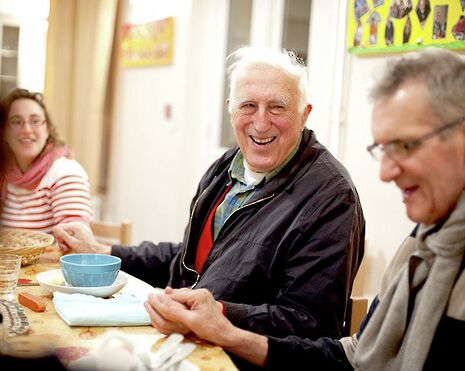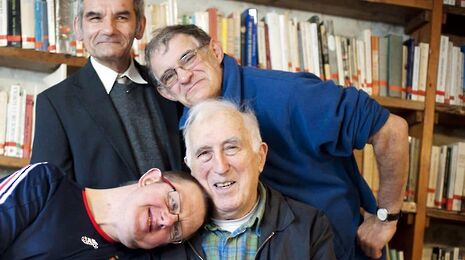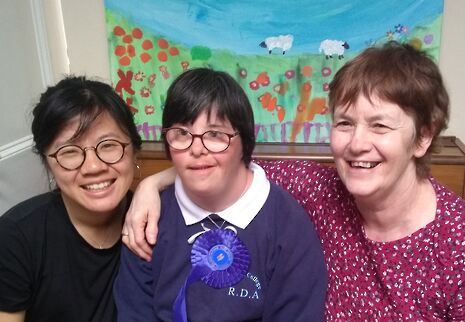Finding a place to land
In the L’Arche-inspired community of Lyn’s House, tan ning-sang found somewhere to be, somewhere to heal, somewhere to call home

Content note: This article contains discussion of depression, anxiety, bipolar disorder, and other symptoms of mental illness.
When I heard of humanitarian Jean Vanier’s recent passing, I was shocked. I had only heard of the name ‘Jean Vanier’ about a year ago, when I stumbled upon a L’Arche-inspired project, Lyn’s House, here in Cambridge. L’Arche is a global network of communities founded by Vanier where people with and without learning disabilities live together. At the time that I stumbled upon Lyn’s House, I was very frustrated with God and Church, having spent the entire year struggling to figure out how to ‘be Christian’ in this foreign environment. I had just moved to the UK from California, where I spent four years being part of a community that worshiped a political, feminist, anti-establishment Jesus who ‘draws near to the margins’. As someone born in a British colony, in Hong Kong prior to the Handover, I hoped to find a Christian community that centered social justice and was intellectually rigorous, worshiping God from a critical postcolonial perspective. But I barely found one Christian who considered such a perspective, let alone any community that did so together. It felt like God only existed within the walls of high-ceilinged, white, masculine churches and chapels – that there was no God for me here in Cambridge.
Yet, on being quite randomly invited to a Lyn’s House tea party last May, immediately upon crossing the dark green threshold, a weight lifted, and I felt God present for the first time since leaving California. The smell of barbecue and sound of laughter filled the air as people with and without learning disabilities enjoyed simply being together in the spring sunshine. The humility, simplicity, generosity, welcome, pure kindness and joy that I encountered on that day are the values that underpin L’Arche and form the essence of Jean Vanier’s teachings.
Jean Vanier founded L’Arche in 1964 after visiting a friend who was the chaplain of a mental health institution in Trosly-Breuil, a village north of Paris. There, Vanier encountered both the extraordinary pain and beauty of people and places that are institutionally hidden from broader society. He remembers, “Huge concrete walls, 80 men living in dormitories and no work. I was struck by the screams and atmosphere of sadness.” Vanier bought a house in the same village and invited two of the mentally disabled men to live with him – the first L’Arche community. Since then, like a mustard seed, L’Arche has grown into an international network of 154 communities across 38 countries. Though the origins of L’Arche are Catholic, the communities are interfaith: the current head of L’Arche France is Jewish, Christians and Muslims live together in Bangladesh and Palestine, the head of the Calcutta community and many others in India are Hindu.
“Many of those who came to l’Arche were in deep need,” Vanier writes, “They carried within their hearts the wounds of rejection. They suffered from a lack of self-esteem and from major physical and psychological difficulties… But above all, they are yearning for meaningful, authentic, respectful, and committed relationships.”
I felt God present for the first time since leaving California
From a sociological perspective, L’Arche clearly provides a model for improving the social marginalisation of intellectually disabled people. Yet, Vanier did not consider L’Arche as a ‘social solution’, but rather as a sign of something more. At the heart of L’Arche is something deeply spiritual. It is a space that suggests a radically different vision of humanity where weak and strong need each other to be fully human, indicative of an ‘upside Kingdom of God’ where the foolish shame the wise, where strength is found in weakness, where the Last shall be First. Vanier describes the process of learning to see and understand this alternative vision of reality as deeply transformative, but also deeply painful and demanding: “As we respond to this fundamental cry for friendship, they begin to transform and to heal us. We can either hide our vulnerability behind a strong, protective ego, or else we can discover that our vulnerability is a source of communion and unity.”

Born in a colony, educated in an American international school separated from society, shuttled to California and then to Cambridge for higher education – without any preparation, emotional or cultural support – I have spent an albeit short lifetime feeling very alone, very misunderstood, looking for a place to land, somewhere to be, somewhere to heal, somewhere to call home. I had been taught and thought that being a high-achiever meant that I would find my place among other high-achievers, in somewhere like Cambridge. But that hasn’t been true at all.
I have now lived in a L’Arche-inspired community for nine months, have visited a L’Arche community in Germany, have stayed at a nearby L’Arche community in Kent, and plan on working as a live-in assistant at a L’Arche community sometime in the future. Without in any way trying to exoticise or further marginalise people with learning disabilities, in every community that I’ve visited, it has been the ‘core members’, those with learning disabilities, who were most welcoming and loving to me, a stranger. In L’Arche, where the turnover rate for volunteers and assistants are high, it is the core members who ground the community. It is around their needs, their interests, and their routines that the rhythm of community life is structured. To be so thoroughly welcomed into the intimacy and vulnerability of this shared life, as a complete stranger, has been a life-changing experience. I have never been in a place so non-judgmental or indifferent about what qualifications I have; I have never felt so unneeding to prove myself to be accepted. Core members never ask questions about what I’m studying or what I plan on doing next – questions that give me deep anxiety – I am simply received with a hello, a smile, an invitation to play and share food. It is through my relationships with core members that I have better learned how to be fully present together, one human to another.
What continues to surprise me about L’Arche is the physicality, smallness, and repetitiveness that such transformative relationships demand: of washing dishes together, praying together, walking together, eating together, of simply sitting silently together – especially with nonverbal friends. It is so diametrically opposed to the heady life of Cambridge. Unlike how many of us have been taught to think about our career plans, the transformation that Vanier describes does not come more quickly if it is intentionally planned, nor can it be measured by any meaningful mark of growth or achievement. It simply happens gradually over time, with patience and through careful nurturing, within the context of a loving community.
For Vanier, “the Word became flesh” indicates that God chose to use the body, particularly the weak body, as the primary access point for people to understand Godself. “A society which discards those who are weak and non-productive risks exaggerating the development of reason, organisation, aggression and the desire to dominate,” writes Vanier, “It becomes a society without a heart, without kindness – a rational and sad society, lacking celebration, divided within itself and given to competition, rivalry and, finally, violence.” L’Arche is a space that prioritises being over doing, the present over the future, the body over the word. It is precisely by participating in such a life of required simplicity and non-productivity that creates enough space for humanity, genuine relationship, God to appear.
There are few places whose very infrastructure propels people so regularly and consistently towards their breaking points
For someone who was programmed to top every ladder of meritocracy, that is a hard, hard pill to swallow. As I did not and do not want to complain about the extreme privilege that I know my education has undoubtedly offered me, in the feelings of dejection and (self-)alienation I’ve had as a foreign woman of colour, I used to hold onto the belief that home was in heaven, with God, after this life. The problem with that, of course, is that I still have to live this life, in this body, and that living this life in this body is not always so easy. Happily, reading Vanier has made me more ready to accept the vulnerabilities of this body and has also made other pills easier to swallow – particularly those that I’ve started to take lately as a result of recent diagnoses.
Vanier was one of few theologians who spoke openly about mental health and intellectual disability. In his seminal book Becoming Human, he wrote, “I have discovered the value of psychology and psychiatry, that their teachings can undo knots in us and permit life to flow again and aid us in becoming more truly human.” In another book, a section entitled “A question on language” addresses the concerns that Disability Studies have about the relationship between a person and their disability. Many Christian communities conceive of mental illness as something ‘dark’ that can only be ‘healed’ through spiritual means like prayer. But reading Vanier has given me vocabulary to talk about psychology and psychiatry as being just as important as prayer in the Christian life, as mental illness not being ‘manifestations of sin’. Vanier has also personally given me the confidence to live openly as Christian and depressed, Christian and bipolar, Christian and disabled.
On a political level, Vanier and L’Arche have also helped me formulate a more grounded, gentle, tactile set of progressive politics. I have long struggled with what I feel to be an overly intellectual element of leftist discourse, where one must be fairly well-versed in the manner and form in which systemic oppression takes place along various axes of racism, sexism, classism, et cetera in order to qualify as ‘woke’ – it seemed rather ableist and exclusivist in a world where knowledge is power and access to knowledge is unfairly distributed from Global South to North. Especially during last year’s strikes, I know that I and many other Christians also struggled with the hostile language, tone, and action that ‘escalation’ seemed to demand, which when berating students who crossed picket lines or calling on specific administrators to resign sometimes felt dehumanising or even violent. Having said that, I also disagree with both anti-intellectuals who simplistically criticise leftists as being out of touch with reality and Frankfurt School critical theorists who see no point in direct action – to decolonise this university and moreover this country obviously requires both a significant amount of physical and intellectual labour.
Bring your voice — write for Varsity Features
Interested in writing for Varsity’s features section? Join our Facebook group to see our latest commissions, or email our Features team with a 150-word pitch of your article idea.
Rather, what L’Arche models is something that is non-intellectual but not anti-intellectual – after all, Jean Vanier had a PhD in Aristotelian ethics, lectured in philosophy, and authored 30 books. Many have drawn parallels between L’Arche communities and the small, village-like communities that Gandhi envisioned. At its heart, L’Arche is a peaceful and caring lived community that jealously guards the vulnerable, centering the needs of those who are intellectually disabled, where every person is seen and accepted first and foremost in the fullness of their humanity, and very secondarily for any ability or achievement that they possess. L’Arche communities are certainly not a replacement for mass demonstration or substantive decolonial knowledge production, but the L’Arche community life models a way of being together, being human, being human together that I have found extraordinarily welcoming, healing, but also generally compatible with most imaginations of progressive politics.
One of the most inspiring things about last year’s strikes was watching students and staff come together to imagine a radically open, inclusive, accessible, anti-racist, feminist, decolonised, sustainable university. It has been particularly encouraging to see how various activist groups, working groups, the CUSU sabbatical team and liberation campaigns have persisted in achieving many victories on divestment, disability accessibility, decolonisation, and the disciplinary procedure. But as I spent a good part of last year organizing for decolonisation and a good part of this year battling the institution for disability adjustments relating to exam accommodations, studying double-time, and intermission, I wonder just how possible it is for the university as an institution – and this university in particular – to be a place that welcomes a body like mine, with its multiple forms of marginality in relation to race, gender, disability, postcoloniality, and immigration status.

In doing my CBT therapy homework for a locally run NHS bipolar psychoeducation group, it became readily apparent that the very structure of Tripos was exactly what constituted the “high risk/trigger situations” that I have been advised to avoid as a person sensitive to mood fluctuations: Exams and studying, too much on your plate, holidays and breaks in routine. In this year that I have spent as a ‘townie’ rather than ‘gownie’ in Cambridge, sidestepping from the university has made me observe that there are few places whose very infrastructure of short terms and high-intensity exams propel people so regularly and consistently towards their breaking points. I am simply not willing to put my body through this anymore.
I broke around this time last year, badly – depression, anxiety, mania, paralysis, psychosis and all. Though the worst of the symptoms have passed, I am far from recovered from the complete destruction that Cambridge exam stress caused: my body has become extremely vulnerable, it gets anxious easily and cannot take much stress, it cannot be pushed to do anything that it does not want, it needs frequent rest and for long periods of time; my mind has lost its ability to concentrate for any prolonged duration of time, to complete complex intellectual tasks, to digest complex information. It feels like what I learned and knew about myself during the first 22 years of my life simply does not apply to this 23rd year. Who I am today is a far cry from the person I was when I matriculated in Michaelmas 2017. I can no longer trust my body or mind, and I have been told that it is unlikely that I will ever be able to go back to operating at the high level of functionality at which I once operated.
By and large, I have succeeded at surpassing all the oppressive, meritocratic expectations placed on my body. But I can’t do it anymore, I won’t do it anymore. I am a body that is hurt, a body in need of healing, a body that needs rest, a body that is tired of surpassing, defying, fighting expectations that go against the interests of my wellbeing. I have spent a long time looking for a place to land, somewhere to be, somewhere to heal, somewhere to call home, a place where it’s okay that I’m confused and inconsistent about how my body and mind operates, where it’s okay for me to wake up at midday and make bread at midnight, a place that acknowledges that simply breathing can be the hardest thing, where there is space to express grief and loathing over a body I no longer recognise.
That place for now, and probably for the near future, is not Cambridge. Though I have received an extraordinary amount of support from various individuals in my college, my faculty, Lyn’s House, the Disability Resource Centre, the University Counseling Service, my GP, PRISM, the Cambridge Adult Locality Team – I still do not feel ready or adequately supported to complete a Cambridge degree at this time. I need a place to land, somewhere to be, somewhere to heal, somewhere to call home, where tears fall freely and laughter rings loudly, where the frailty of my body is pain to be shared, where my mind unlearns competition and remembers creativity. Thankfully, I think I have finally found that place, in the open, welcoming arms of a disabled other, in this mysterious and magical place called L’Arche. For now, and likely for the near future, that is the place where I’ll land, the place I’ll be, the place I’ll heal, the place I’ll call home.
 News / Colleges charge different rents for the same Castle Street accommodation2 March 2026
News / Colleges charge different rents for the same Castle Street accommodation2 March 2026 News / News in Brief: waterworks, wine woes, and workplace wins 1 March 2026
News / News in Brief: waterworks, wine woes, and workplace wins 1 March 2026 News / Climate activists protest for ‘ethical careers policy’1 March 2026
News / Climate activists protest for ‘ethical careers policy’1 March 2026 News / Angela Merkel among Cambridge honorary degree nominees27 February 2026
News / Angela Merkel among Cambridge honorary degree nominees27 February 2026 News / Private school teacher who lied about Cambridge degree barred from teaching27 February 2026
News / Private school teacher who lied about Cambridge degree barred from teaching27 February 2026









